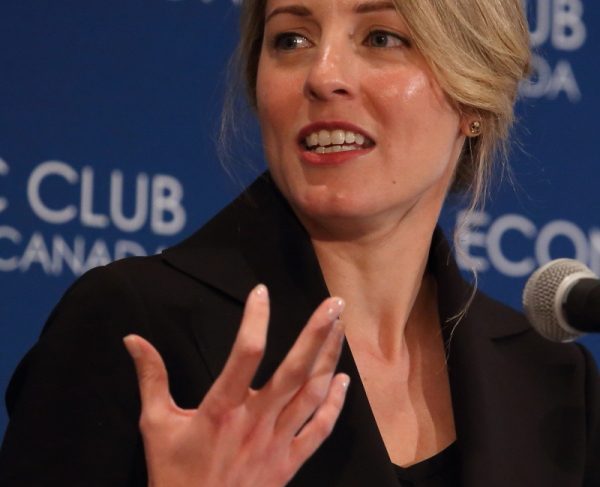
Joly says 6,000 have responded to early culture consultation
TORONTO – Businesses should invest in the cultural sector – including hiring artists – in order to help the economy grow and open new markets, Heritage Minister Mélanie Joly told a business audience Thursday in Toronto.
“Does that mean you need artists, writers and musicians in your business? Well, at the very least you need some people who think like artists, writers and musicians,” Joly told the Economic Club of Canada. Joly urged industry to invest in the cultural sector because not only do companies have the money but also because it will also be profitable.
She noted that according to CIBC, corporate profit margins in Canada area at a 27 year high, with many sectors preforming above the average for the past 13 years. Two of the best performers were the arts and entertainment, and information and cultural sectors, she pointed out.
Finally, she asked businesses to support cultural projects that help build a more creative community. In short she said the cultural sector is “a great business opportunity.”
Investments in culture help attract top talent to communities, she argued,, spurs creativity and innovation among employees and “ultimately it helps grow you business, and yes, grows your profits.”
The creative sector is an economic driver in Canada, she said, noting that the cultural sector represents three per cent of GDP, generating $54.6 billion in economic activity and accounts for more than 630,000 jobs. The sector is larger than the hospitality, agriculture, forestry and fishing sectors combined, she said.
Later in an interview with reporters Joly repeated that “everything is on the table” for discussion – including foreign investment – in her upcoming public consultation on updating government policy in the broadcasting, media and cultural industries.
“Strengthening Canadian content in a digital age and developing a cultural export strategy is the topic of the consultation,” she said. “So we're really looking at how we can develop a new model that will be adapted to the digital age.”
Her department just ended a so-called pre-consultation for citizens with an online questionnaire to help frame the upcoming formal public sessions and submissions. There were over 6,000 responses in this early consultation. Joly wouldn't say what she got out of them, only that an outline will be revealed shortly.
“Much of the future lies in digital goods and services,” – Mélanie Joly, Heritage Minister
Asked whether in an era of global digital content Ottawa can have much of an impact, she noted that the federal government has had a policy of supporting artists for years, including the Canadian Media Fund, a public-private sector partnership. The TV and film industry generated $7 billion in production, $3 billion of which was exported, she noted. “So clearly the link between government and the private sector in the creative industries is very relevant, and because of that we have a very competitive position compared to other countries.
“I'm proud of our model and I think we can better it. Its my belief in the federal government as a catalyst that I'm launching this public consultation.”
In her speech said the government and the private sector can collaboration to lead the transformation brought by the shift to digital content. “Much of the future lies in digital goods and services,” she said, including the huge move to streaming video.
She also tried to draw culture into other areas, arguing that “creativity and innovation are key to successes in other industries” including finance, banking, IT and agriculture.
Still, Joly noted that Canada ranks only fourth in “creativity” by the University of Toronto's Martin Prosperity Institute. So, she said, right now Canada's “not ready.” That's why the new Liberal government is taking “bold steps” in culture and creativity by investing $1.9 billion in what she called the creative sector.
“To position Canada as a global leader we need to do a better job of promoting creative environments and talents,” she said, “and fostering quality, innovation and risk-taking.
Photo by Howard Solomon.